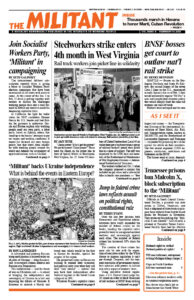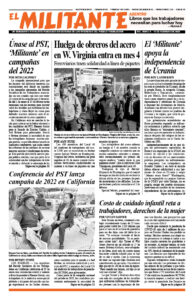SEATTLE — Bosses on the Burlington Northern and Santa Fe Railway, the second largest of the seven Class I lines in the U.S., announced in early January that as of Feb. 1 they would unilaterally impose “Hi-Viz,” a new and complicated absentee policy that would sharply limit the time rail workers can take off work.
Workers were outraged and the two largest rail unions — the Transportation Division of the International Association of Sheet Metal, Air, Rail, and Transportation union, known as SMART-TD, and the Brotherhood of Locomotive Engineers and Trainmen — responded by preparing for a strike against the attack on their members. The two unions organize 17,000 engineers, conductors, switchmen and brakemen on the BNSF.
The bosses went to court, demanding a temporary restraining order banning strikes, sickouts, slowdowns, picketing or any kind of worker protest against the onerous new policy. U.S. District Court Judge Mark Pittman in Fort Worth, Texas, the home of the company’s headquarters, granted their motion and more.
He brushed aside the unions’ arguments, saying “BNSF would suffer substantial, immediate, and irreparable harm” for a strike, while the union (and, presumably, its members) “would not suffer any harm.” He added that any strike “would exacerbate our current supply-chain crisis — harming the public at large, not just BNSF.”
The judge also ordered the rail unions to take action to prevent workers from organizing any kind of protests that might interfere with BNSF operations.
Outside the courthouse, family members of rail workers picketed, explaining the impact Hi-Viz would have on workers’ safety and family lives. The unions are appealing the decision, which is set to run through Feb. 8, arguing there are substantial workers’ issues and rights involved and a strike is legal.
“Our members have simply had enough of the treatment they are enduring from BNSF,” SMART-TD President Jeremy Ferguson and Brotherhood of Locomotive Engineers and Trainmen National President Dennis Pierce said in a joint statement after the court ruling. The company’s new Hi-Viz policy is “outright insulting.”
Conditions facing rail workers today are daunting. Crews have been cut, hours increased, and safety conditions deteriorated. Most have no set schedule of hours, or work a schedule that is subject to frequent changes. These schedules don’t allow them to plan time off with their family, set medical appointments, care for sick relatives, or take care of other needs. Many work 12-hour shifts and are entitled to only 10 hours of undisturbed rest from the moment they finish a shift. Fatigue is a major problem, and the strains of the work schedule impact workers’ lives off the job.
Previously, BNSF workers could miss five weekdays and two weekend days a month without penalty — as long as the day wasn’t a holiday. The new policy penalizes workers for each and every absence, with greater penalties for holidays, Fridays and weekends, and for taking extra time off before or after vacation days and legally mandated rest periods. Bosses will allow workers to “earn back” attendance points slowly, if they remain constantly available for work. Missing work under the Family Medical Leave Act or for union business resets any time you have “earned back,” which penalizes union officers who take time off to represent workers accused of rule violations by the company.
“I’ve never been in trouble for attendance in the seven years I’ve worked here. A lot of times I don’t take the seven days I was allowed each month,” said Matt Sabey, a conductor in the Seattle area. “But under the new absentee policy, that can still get me fired in a few months.”
Hobbled by government red tape
Rail transportation is essential to the profits of all the ruling capitalist families. It is economically, politically and militarily central to the U.S. economy. The efficiency of moving massive quantities of commodities by rail make the coal, oil, steel, agribusiness, chemical, and automobile industry bosses — among others — deeply dependent on rail transportation for transforming the labor of workers into their profits.
Every fight over wages and working conditions by railroad workers over the past 140 years has faced direct intervention by the government, especially since the anti-union Railway Labor Act was passed in 1926. The pro-boss law, the Federal Railway Administration admits, is meant to prevent workers from being able “to take action in bargaining disputes until they have completed an elaborate, time-consuming process involving negotiation, mediation by the National Mediation Board, possible review by a Presidential Emergency Board, and cooling-off periods.”
Each new rail labor struggle has been answered by the federal government with efforts to deprive workers of the right to strike. But boss attacks on working conditions force rail workers to push back.
“Union membership in this country used to be as high as a third of all Americans, and now we’re down to in the private sector like 6%,” said Matt Weaver, director of internal organizing with the Brotherhood of Maintenance of Way Employees Division of the International Brotherhood of Teamsters, at a Jan. 22 rally in support of Steelworkers on strike at Special Metals in Huntington, West Virginia. “I think that as you see union numbers coming down, the rich people are getting richer, and the working class is just standing still or getting worse for us.” He added, “Unions have to stand up for one another.”
The fight against Hi-Viz “is an issue that affects rail workers nationally,” Joe Allen, a conductor with over 16 years experience at CSX railroad told the Militant. “Rail workers all over could unite around this common theme. This unity is the basis for a stronger voice.”
U.S. rail bosses have been demanding more concessions, including a one-person “crew,” in contract negotiations.
We should fight for no trains over 50 cars in length, with four-person crews — two engineers on the locomotive and two workers on the rear of the train. We need enough workers so we can take control over our work schedules and the right to take time off as we need. And, for a safe workplace, we need to use union power to fight for workers control.
Henry Dennison works as a conductor for the BNSF in Seattle.

